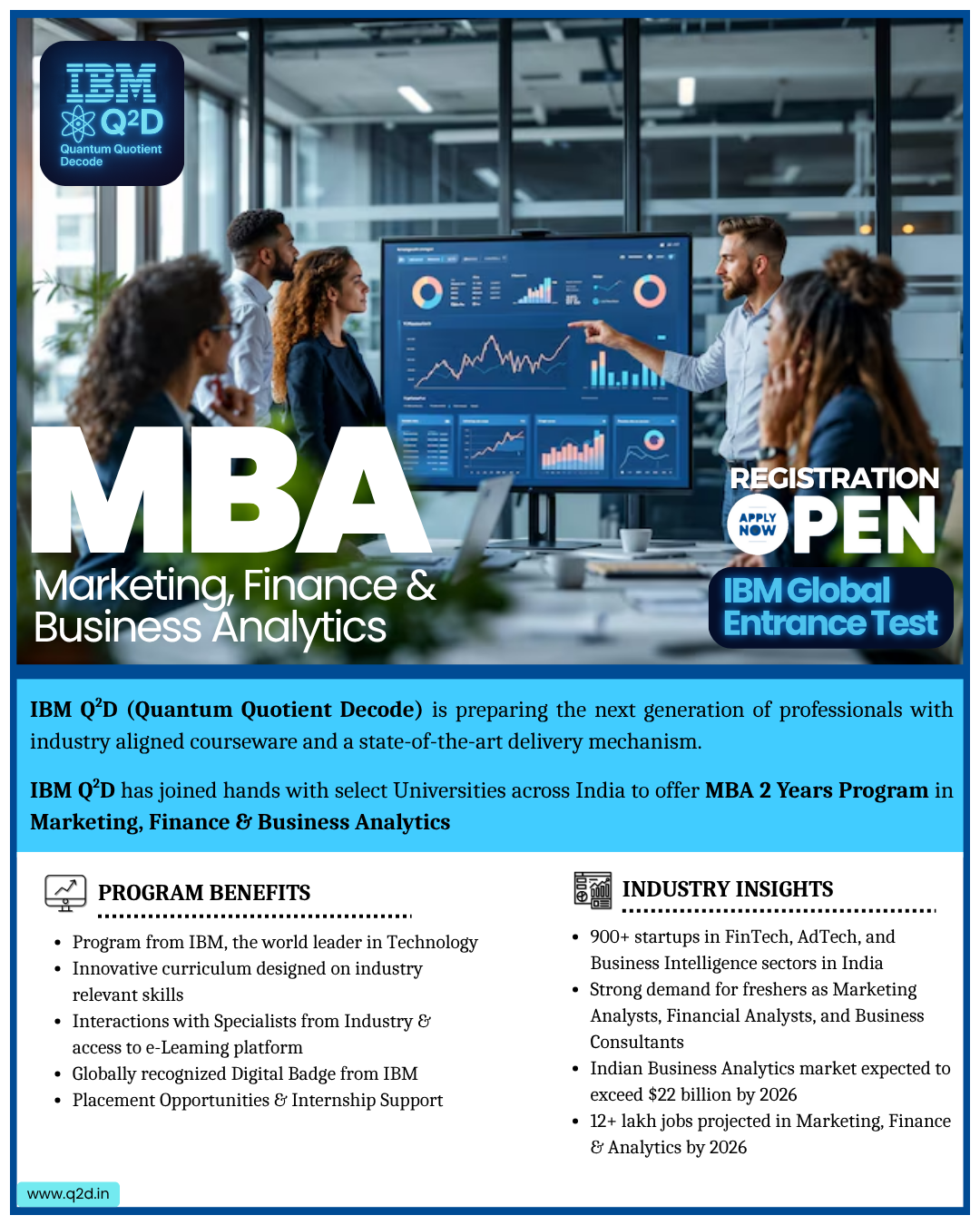Program Description:
IBM Q²D is a global initiative offering specialized master’s programs in collaboration with top academic institutions. We are offering an advanced 2-year MBA program specializing in Marketing, Finance & Business Analytics.
S - Vyasa Deemed to be University located inside Sattva Global City, Kengeri, which is a NAAC A+, Category 1 University, would be the first university in India to execute this model of student engagement in partnership with IBM. The program is designed to equip students with cutting-edge skills, real-time exposure, and practical project experience, aligning with future workforce demands.
You've embarked on a cutting-edge master's program, crafted with industry leaders and delivered by IBM subject matter experts in a world-class learning environment.
Program benefits include:
- A Postgraduate Degree awarded by S-VYASA
- An Advanced Certificate Digital Badge from IBM
- Advanced Learning Certificate from Cambridge University Press and Assessment
This strategic academic-industry collaboration is designed to equip students with both foundational knowledge and practical skills in emerging domains, preparing them for high-impact careers in the digital era.
Campus Location:
All programs are conducted at the futuristic S-VYASA Bangalore Campus, located inside Sattva Global City IT Park, Kengeri.
This Advanced Certificate in Analytics for Business is designed to equip professionals with a robust understanding and practical skills in leveraging data for informed decision-making across various business functions. The program progresses from foundational data handling and descriptive analytics to advanced predictive modeling, culminating in specialized applications of analytics across key industries. Learners will learn to transform raw data into actionable insights, driving strategic growth and optimizing performance in a data-driven world.


FEE STRUCTURE 2025-26
| Duration: 2 Years | I YEAR | II YEAR |
| Admission fee | 15000 | - |
| Tuition Fee | 395000 | 385000 |
| Other Academic Fee | 5200 | 5200 |
| Total Fee | 415200 | 390200 |
Program Objectives
Upon successful completion of this program, learners will be able to:
- Master fundamental data manipulation and analysis techniques using widely accessible tools like Excel.
- Apply descriptive analytics and business intelligence concepts to interpret historical data and generate insighƞul reports and dashboards.
- Develop and implement predictive models to forecast future trends and outcomes, utilizing advanced analytical techniques.
- Strategically apply analytical methodologies and insights to address specific business challenges and opportunities within banking, retail, healthcare, manufacturing, finance, HR, marketing, and supply chain domains.
- Communicate data-driven insights effectively to various stakeholders for enhanced business decision-making.
Program Summary
The "Advanced Certificate in Analytics for Business" is a practical, application-focused program that guides learners through the journey of transforming data into strategic assets. Starting with foundational Excel skills for data handling, it progresses to mastering descriptive analytics for understanding past performance and then delves into advanced predictive techniques to anticipate future trends. The program culminates in a comprehensive exploration of how these analytical skills are specifically applied across critical business functions and diverse industries, preparing graduates to confidently leverage data for competitive advantage.
Flow of Learning Modules:
- This module serves as the foundational stepping stone, introducing learners to the core concepts of data and its role in business.
- It focuses on practical, hands-on data manipulation, cleaning, and basic analysis using MicrosoŌ Excel, a ubiquitous tool in business environments.
- Learners will build a strong base in data organization and initial insights, preparing them for more complex analytical methods.
- Building upon Module 1, this module delves into the "what happened" aspect of data.
- Learners will learn to summarize, visualize, and interpret historical data to identify trends, paƩerns, and anomalies.
- The focus is on developing robust reporting and dashboarding skills, enabling them to create meaningful representations of business performance.
- This module lays the groundwork for understanding current business states and identifying areas for further investigation.
- This module transitions from "what happened" to "what will happen," introducing learners to the realm of forecasting and prediction.
- It covers various advanced analytical techniques and methodologies, enabling learners to build models that predict future outcomes.
- Topics will likely include statistical modeling, regression analysis, and potentially an introduction to machine learning concepts for predictive purposes.
- This module equips learners with the skills to anticipate future business scenarios and proactively plan.
- This capstone module applies the analytical knowledge and skills gained in the preceding modules to specific industry contexts.
- Learners will explore real-world use cases and challenges within diverse sectors, understanding how data analytics drives value in each.
- The module emphasizes tailoring analytical approaches to solve industry-specific problems and make data-informed decisions across various functional areas.
Program Outcomes:
Upon successful completion of this program, learners will be able to:
- Perform comprehensive data analysis, from raw data preparation to insighƞul visualization and reporting.
- Utilize descriptive and predictive analytical techniques to derive actionable insights from business data.
- Develop and apply analytical models for forecasting, trend identification, and paƩern recognition.
- Formulate data-driven strategies and solutions for complex business problems across multiple industries.
- Effectively communicate analytical findings and recommendations to non-technical stakeholders.
- Contribute to data-driven decision-making processes within their organizations.
Skills Gained:
Upon completion of this program, learners will gain the following skills:
- Data Cleaning and Preparation (using Excel)
- Data Manipulation and Transformation (using Excel)
- Descriptive Statistics
- Data Visualization and Reporting
- Business Intelligence Dashboarding
- Predictive Modeling Techniques (e.g., Regression)
- Statistical Analysis
- Forecasting
- Problem-solving with Data
- Industry-Specific Analytics Application (Banking, Retail, Healthcare, Manufacturing, Finance, HR, Marketing, Supply Chain)
- Data-driven Decision Making
- Communicating Analytical Insights
